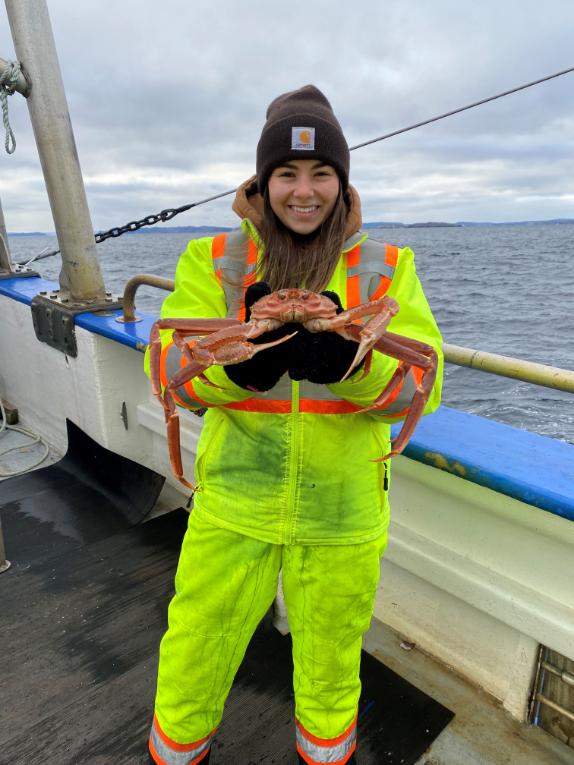Geneviève Peck

Masters (Thesis) Student, School of Fisheries (Fisheries and Marine Institute)
Tell us about some of your research interests! What was the focus of your Master's thesis?
"My primary research interests are conservation and sustainability. The title of my master’s thesis is “Evaluating the suitability of existing low breaking-strength components for the snow crab fishery in Newfoundland & Labrador.”
Specifically, I’m really interested in anthropogenic (human) impacts on aquatic species, particularly the reduction of marine mammal bycatch (meaning reducing the accidental catch of marine mammals in fishing gear).
I believe in finding ways to better coexist with aquatic species. We need to adjust the way we use the ocean in order to reduce our impacts and protect marine ecosystems and fisheries alike!"
What made you decide to come to Memorial to study? What has your experience been like?
"I grew up in a rural northern community in Ontario called Hearst. I was always connected to nature through my interests and my lifestyle, however, it wasn’t until the last year of my undergraduate degree in Sudbury, Ontario, that I realized I could study it as a career. I did my honors thesis on the impacts of smelter emissions on Lake Biota during which I discovered an interest for conservation and fisheries.
Since I had been in, on, and around lakes my whole life, I decided to dip my toes (pun intended) in the world of marine science for my Masters degree, and decided to apply to Memorial University, mainly for the location and the Fisheries Science and Technology graduate program at the Marine Institute.
Being on an Island in the North Atlantic, immersed in the rich fishing and marine culture, students at Memorial have the opportunity to live and work by the ocean and with people who are incredibly passionate and dedicated to it. The experiences I have had here, as part of my field work and course work, are unique, and overall, it has been a very special experience."
What was your favorite class?
"My favourite class was “Ecology, Management and Practice of North Atlantic Fisheries.” Especially as someone who isn’t from the province, it was a great way to learn about Newfoundland fisheries and a very good introduction to fishery management as well as many concepts and policies that are highly relevant in our work.
For example, learning more about the cod moratorium and other shifting stocks from researchers who study it firsthand, while also learning about federal, provincial, and international policies that relate to fishery management. We also learned about the implementation, regulation and enforcement of such policies, as well as the many moving parts of stock assessments: the who, what, where, when and how!"
What are you excited about right now?
"I am currently excited about completing my MSc. in the fall and publishing my research! I have submitted my first chapter, titled “Hauling snow crab traps in Eastern Canada: a study documenting tension in ropes,” for publication in a special edition of the Fishes journal dedicated to snow crab.
I am also currently working on my last experiment, focusing on a specific type of low-breaking strength device that utilizes hydraulic fluid for a timed release, to assess the effect of temperature on time. Overall, this work aims to evaluate whether these entanglement mitigation devices are a good fit for the cold, heavy and deep Newfoundland and Labrador snow crab fishery."
What are your plans for the future?
"I plan on pursuing a PhD after working for a few years in conservation research (hopefully bycatch related) and diversifying my experience and research abilities. Where I go next is still uncertain. If there is an opportunity to stay in Newfoundland, I would take it! However, for my PhD I will most likely have to move closer to researchers and centers who are more immersed in marine mammal bycatch research."
What is something you want everyone to know about the ocean and/or the North?
"Cold water temperatures do not mean the ocean is not rich and diverse in species, landscapes and colours! You would be surprised by everything you can find under the waves around Newfoundland; from cod to capelin (especially during the capelin roll), wolffish, flatfish (skates!), jellyfish, nudibranchs (aka sea slugs), many species of starfish, crabs, lobsters, scallops, even seabirds diving for food and so much more!
What’s almost more impressive is the colourful forests of kelp, incredible visibility and gorgeous rocky bottoms that surround you. (Oh, and did I mention the various shipwrecks you can find all around the island?)"
